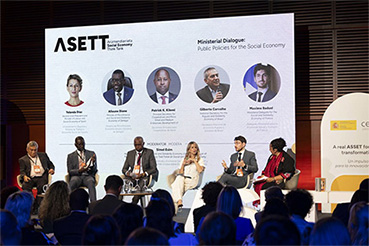The Kursaal Congress Centre in San Sebastián hosted the 1st ASETT International Forum (Arizmendiarrieta Social Economy Think Tank) on May 29–30, bringing together more than 100 international speakers to discuss the future of the social economy, alliances and internationalisation.
Created in February 2025, ASETT is a cutting-edge hub promoted by the Spanish Business Confederation of the Social Economy (CEPES) and the Mondragón Corporation. It is financed by Spain’s Ministry of Labour and Social Economy using European funds, and supported by numerous public institutions in the Basque Country.
ASETT is supported by an international advisory board of 15 members, including representatives from the United Nations, the European Parliament, the OECD, and leaders in the social economy from the Americas, Europe, Africa, and Asia. Most were present at the Forum in San Sebastián, including Simel Esim, Director of the ILO’s Cooperative, Social and Solidarity Economy Unit; Amal Chevreau, Senior Analyst at the OECD; Aude Saldana, Secretary General of the Global Social Economy Forum (GSEF); and Pauline Effa, Co-founder of the African Forum FORAESS.
37 success stories for 11 social challenges
The Forum presented 37 success stories structured around 11 identified social challenges (View Sessions). The core themes focused on social innovation, inclusion, culture, gender, housing, impact measurement, visibility, care, health, food, technology, and the link between social economy and universities. Other panels addressed current political and economic issues such as cooperativism in a polarised world, and the role of the social economy in the Global South.
Professor Inmaculada Carrasco, President of OIBESCOOP and member of CIRIEC-Spain’s Scientific Committee, was a key participant. She contributed to the session on measuring the social impact of the social economy and later took part in the panel on Social Economy and Universities, where she presented data from the CIRIEC-Spain Researcher Directory and the educational role of Spanish universities and ENUIES research centres.
Manifesto “Social Economy: a path towards climate and social justice”
The 1st ASETT International Forum concluded with the adoption of a manifesto, an open invitation to the world to recognise and strengthen the social economy as a force for transformation in the face of challenges such as inequality, social exclusion and the climate emergency. The manifesto, entitled “Social Economy: a path towards climate and social justice”, is a collective commitment that makes a clear call to action: the social economy is a real, viable and transformative business model.
The manifesto was presented by Spain’s Second Vice-President and Minister of Labour and Social Economy, Yolanda Díaz, who emphasised that in uncertain international times like these, cooperation between countries and the commitment of public authorities and global institutions is more essential than ever to promote models such as the social economy, “which advocates for fairer wealth distribution, social justice, and the fight against labour inequality”.
During the closing ceremony, the continuation of the ASETT project and future editions of the Forum were announced. Juan Antonio Pedreño, President of CEPES and Social Economy Europe, said that ASETT “is a transformative alliance born of collective commitment and projected into the future with ambition and purpose. An alliance that not only diagnoses challenges but acts, innovates, proposes and builds. It puts today’s tools at the service of the social economy to anticipate tomorrow.”
And he concluded: “From Donostia, from this Forum, we reaffirm once again that the social economy is ready to lead the major changes of our time. The deterioration of the planet and inequality must not leave us inert. The social economy is a proven vaccine. It’s time to mass-produce it.”







